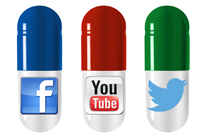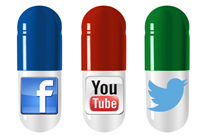On June 18, 2014, the US Food and Drug Administration (FDA) released draft guidelines regarding how medical device manufacturers could use social media, Twitter, and other space-limited platforms and for the purpose of responding to misinformation.
On June 18, 2014, the US Food and Drug Administration (FDA) released draft guidelines regarding how medical device manufacturers could use social media, Twitter, and other space-limited platforms and for the purpose of responding to misinformation. The documents released were to provide clarification for its previously stated stance concerning online communication.
The FDA provides rather stiff oversight of medical device marketing agencies. As evidenced by the 2012 warning letter sent to a drug product maker for liking an unapproved Facebook post. Social media, with all its varied platforms, has presented a somewhat unique challenge when it comes to FDA oversight.
One of the biggest problem comes in the restriction of letters on some social media platforms – particularly Twitter and similar venues. The big problem, however, has been that there were more questions left unanswered by the FDA and clarification was desperately needed.
The Misinformation Statement
The first draft guideline concerns correcting third-party misinformation about prescription drugs and medical devices on social media or the Internet in general.
This particular guidance statement refers to content generated by users of third party websites, platforms, and venues. The FDA does not require companies to respond to misinformation, be it negative or positive. However, the FDA does believe it’s in the best interest of the public for companies marketing medical devices to consumers to clear up misconceptions about these devices that are found on the World Wide Web.
In these instances and as long as the firm in question is truthfully attempting to correct misinformation about their products going around the World Wide Web, the FDA has no plans to object to corrective information makers of medical devices submit, even if it does not satisfy all the regulatory requirements that would be expected for advertising and/or labeling.
On the other hand, if the company in question provides information that is misleading or not truthful, the FDA fully intends to object to failures to comply with the appropriate regulatory with any applicable regulations regarding labeling or advertising.
Limited Character Social Media Guidance
The second draft guideline document addresses the problem facing the use of Twitter and similar venues that limit the characters in posts in addition to other challenges represented by social media.
As far as the Twitter issue, which the FDA also extends to online sponsored link advertising, the FDA warns that it will not be making allowances for character limits in these venues and that marketers will need to incorporate risk information within the confines of the character limits.
An example of a tweet for a hypothetical memory loss drug (NoFocus) provided in the FDA guideline follows. Note the incorporation of the risk information, including a direct hyperlink to the product website page of “Important Safety Information” devoted to providing comprehensive risk information about the product. Also note that there only a dash (with no space) between the benefit and risk. Finally, the tweet spells out the nature of the benefit (i.e. mild to moderate memory loss vs. simply memory loss).
Example tweet noted by the FDA:
NoFocus (remembering HCl) for mild to moderate memory loss-May cause seizures in 503 patients with a seizure disorder www.nofocus.com/risk
The fact that all the information, including the risk information, must be contained within the body of a single tweet — rather than a series of tweets explaining benefits and risks — means that, for the most part, Twitter and other text-based advertising venues are not an optimal choice for marketing medical devices.
These documents are available for public comment until September 16, 2014. The FDA will make final recommendations after this date.








